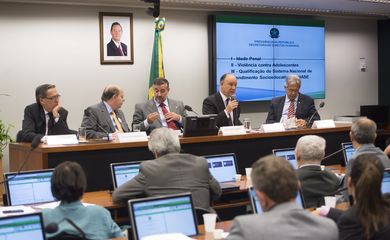Deputies' committee approves lower responsibility age for serious crimes




The approval of the proposal, by 21 to 6 votes, came after extensive negotiations and changes to the draft submitted by the rapporteur
After a nearly six-hour discussion on Wednesday (June 17), a special committee of the Chamber of Deputies approved a proposed constitutional amendment lowering the age of criminal responsibility (PEC 171) from 18 to 16 years old for serious crimes.
The approval, by 21 to 6 votes, came after extensive negotiations and changes to the draft submitted by the rapporteur, Deputy Laerte Bessa, last week. In a move to make the proposal more compelling and gain broader support, he added a provision to limit the new age threshold exclusively to cases of serious felonies known in Brazilian law as “heinous crimes” (such as rape and robbery resulting in death), aggravated assault, and aggravated robbery.

Protesters contrary to the proposal blew whistles outside the session room
As they learned about the result, protesters contrary to the proposal started blowing whistles outside the session room, which had been closed to the public. Meanwhile, deputies supporting the amendment celebrated the approval singing a popular soccer chant line that goes, “I'm Brazilian with so much pride and so much love”. The proposal will now be submitted to a first round of vote in a plenary session at the Chamber of Deputies on June 30, as announced by the Speaker of the House, Deputy Eduardo Cunha.
In another move to secure approval, rapporteur Laertes Bessa removed a provision to hold a referendum on the issue. “We thought it was no longer needed. The legitimacy [of the proposal] is endorsed by current studies carried out in Brazil, showing that 90% of Brazilians are favorable to lowering the age of criminal responsibility,” he said. He kept provisions that the sentences be served by teenagers under 18 and older than 16 years in segregation from adults or children under 16 years old.

Deputy Laerte Bessa
As he presented the heinous crime limitation, Bessa said he used most of the recommendations made by the opposition Brazilian Social Democratic Party (PSDB). According to Bessa, although his personal position is “stronger” than the approved proposal, he incorporated the recommendations in order to secure easier negotiations and satisfy varying party positions and the popular calls for “repressing atrocious crimes committed by teenagers.”
A retired police chief in the Federal District, the rapporteur said he believes a 16-year-old is able to tell right from wrong, a conviction he gained in the course of his 30-year career in the police. Bessa said he was convinced that his opinion will be echoed among deputies when the proposal is voted in the first round on June 30. Because it is a proposed constitutional amendment, favorable votes by at least 308 deputies are required for approval.
Alessandro Molon, deputy leader of the ruling Workers' Party (PT), and one of the fiercest adversaries of the proposal, said the dissenting voices will work hard to change the result in the plenary session. “More than a majority, they [proposal supporters] will have to achieve 60% of the vote. I think in the plenary voting we'll have better chances of showing the proposal is unconstitutional, and rather than reducing violence, it will worsen the problem, putting minors in prisons only to become crime graduates.”
Translated by Mayra Borges
Fonte: Deputies' committee approves lower responsibility age for serious crimes



